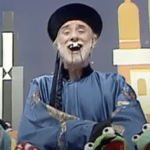 Our World
Our World  Our World
Our World  Crime
Crime 10 Dark Details of the “Bodies in the Barrels” Murders
 Animals
Animals The Animal Kingdom’s 10 Greatest Dance Moves
 Movies and TV
Movies and TV 10 Box Office Bombs That We Should Have Predicted in 2025
 History
History 10 Extreme Laws That Tried to Engineer Society
 History
History 10 “Modern” Problems with Surprising Historical Analogs
 Health
Health 10 Everyday Activities That Secretly Alter Consciousness
 History
History Top 10 Historical Disasters Caused by Someone Calling in Sick
 Animals
Animals 10 New Shark Secrets That Recently Dropped
 Movies and TV
Movies and TV 10 Forgotten Realities of Early Live Television Broadcasts
 Our World
Our World 10 Places with Geological Features That Shouldn’t Exist
 Crime
Crime 10 Dark Details of the “Bodies in the Barrels” Murders
 Animals
Animals The Animal Kingdom’s 10 Greatest Dance Moves
Who's Behind Listverse?

Jamie Frater
Head Editor
Jamie founded Listverse due to an insatiable desire to share fascinating, obscure, and bizarre facts. He has been a guest speaker on numerous national radio and television stations and is a five time published author.
More About Us Movies and TV
Movies and TV 10 Box Office Bombs That We Should Have Predicted in 2025
 History
History 10 Extreme Laws That Tried to Engineer Society
 History
History 10 “Modern” Problems with Surprising Historical Analogs
 Health
Health 10 Everyday Activities That Secretly Alter Consciousness
 History
History Top 10 Historical Disasters Caused by Someone Calling in Sick
 Animals
Animals 10 New Shark Secrets That Recently Dropped
 Movies and TV
Movies and TV 10 Forgotten Realities of Early Live Television Broadcasts
Top 10 TV Shows Cancelled Too Soon
“There’s nothing on.” We’ve all uttered those words, especially since lockdowns and quarantines have left most of us housebound for the foreseeable future. Click, click, click… 200 channels of rubbish.
Oh look… it’s season 7 of The Curse of Oak Island,[1] a show where a team of questionably intelligent treasure hunters spends a full hour digging an empty hole. Meanwhile, on Showtime, Black Monday[2] is so terrible it makes me hate the infinitely likable Don Cheadle. Perhaps I’ll catch a rerun of Big Bang Theory, which is good for a muffled laugh once every fourth season.
Why did these crappy shows get made and the following ten get cancelled? They don’t call it the boob tube for nothing.
Top 10 TV Shows That Predicted The Future And Got It Right
10 Police Squad! (1982, 6 episodes)
“Is this some kind of bust?”
“Yes, it’s very impressive. But we’d just like to ask a few questions.”[3]
A comedy well ahead of its time[4], Police Squad! parodied detective dramas with rapid-fire jokes. Eschewing a sitcom-style laugh track, Leslie Nielsen and company let viewers decide for themselves whether a joke was funny. While nowadays comedies without laugh tracks are commonplace (Modern Family, Veep), in the early 1980s it was a daring novelty that, unfortunately, fell on deaf ears for too many.
For starters, Police Squad! had one of the best intros in television history: a point-of-view runaway cop car speeding through various comedic scenes over the opening credits. Years later, Family Guy paid the ingenious bit homage[5] with a scene featuring Stewie on his tricycle. The closing credits were just as good,[6] with the main characters in a self-imposed freeze frame while the rest of the scene continues, often to their detriment.
In between, Police Squad! was… well, it was the Naked Gun movies in a TV show (the films are direct descendants of the show, down to the main character, Frank Drebin). How the hell does that gets cancelled after half a dozen episodes?
Of note, Police Squad! holds a unique distinction among prematurely cancelled TV shows: combined, the three movies it inspired have a longer running time than all of its episodes put together.
9 It’s Garry Shandling’s Show (1986, four seasons)
“This is the theme to Garry’s show, the theme to Garry’s show. Garry called me up and asked if I would write his theme song…”
It may feel a bit odd to include a series that aired 72 episodes on this list. But It’s Garry Shandling’s Show, which began on Showtime before eventually being picked up by the then-fledgling Fox Network, was among the most inventive programs ever.
It took the neurotic brilliance of the late Garry Shandling to create the first major sitcom to break the fourth wall. The concept – a sitcom that knew it was a sitcom, with the main character side-tracking to address the audience – broke the mold and paved the way for other out-of-the-box series, first among them the “show about nothing” hit Seinfeld.
His crowd is welcomed in on the act. “If you’re in a bad mood don’t come in here and take it out on my audience,” Garry tells a friend in a restaurant scene, “they’ve been here since 7 am.” The studio audience then pelts Garry’s lunchmate with rolls.[7]
Despite deserving a longer run, the show took Shandling mainstream and set the star-studded late-night stage[8] for his role as variety show host Larry Sanders, one of the smartest, funniest series ever.
8 Twin Peaks (1990, two seasons)
Two questions: Who killed Laura Palmer,[9] and why the hell did the most inventive whodunnit ever get axed after two seasons?
The first question is less relevant than the latter, because if you watched Twin Peaks with the single-minded goal of learning who the killer really was, you were watching it wrong. The cryptic drama is a freak show dive into the underbelly of small-town Americana. Everyone has something to hide and nothing is as it seems. As Log Lady[10] puts it in her maniacal monotone, Laura Palmer is but the “one leading to the many.”
Like no other show in TV history, Twin Peaks was driven by its weirdness. From marble-mouthed dancing midgets to the ubiquitous yet ungraspable Killer Bob,[11] David Lynch’s highly unorthodox storytelling leaves viewers guessing about what’s real, what’s imagined, and what each new twist and turn down the show’s winding path represents.
When Twin Peaks left the air after two seasons, with many main characters presumably dead and the show’s protagonist possessed by an evil spirit, viewers had more questions than answers[12] – a longing that ultimately led to the show’s brief 18 episode revival in 2017.
7 The Critic (1994, two seasons)
Some actors never reach their full potential because their ideal vehicles – that perfectly suited project taking them another level of stardom – gets grounded before it can soar. Such is the case with Jon Lovitz, whose short-lived animated series, The Critic, fell victim to a premature two thumbs down from network executives.
Smart, adult-targeted cartoons have a history of quick hooks. Notably, Seth MacFarlane’s Family Guy survived two cancellations[13] to become one of the most successful animated series ever.
The Critic had a promising premise: Lovitz voices Jay Sherman, a balding, plump sarcastic film critic patterned after himself. Its basic schtick saw Sherman shoveling popcorn into his mouth while watching what are essentially parodies of well-known Hollywood films. “Tonight, “he quips, “I’ll be reviewing Home Alone… 5” Cut away to Catherine O’Hara on a plane, panic-stricken at having left Kevin home yet again, “…and he’s only 23!”
Above is a montage of some of the best film parodies, including Tim Burton’s “The Nightmare Before Hanukkah” and Dennis the Menace 2 Society, in which Mr. Wilson finally gets what’s coming to him.
The Critic was a cartoon Curb Your Enthusiasm; it’s what happens when a talented comedian gets to play an exaggerated version of himself. Arrogant, bad with women and unflinchingly cynical, Lovitz as Sherman had an authenticity to it that transcended most animated series. Unfortunately, not even a 1995 Simpsons crossover episode[14] saved it from the cutting room floor. And that, per Sherman’s catchphrase, “stinks!”
6 Mr. Show (1995, three seasons)
Before he broke bad as corrupt lawyer Saul Goodman, Bob Odenkirk was one half of a short-lived sketch comedy show on HBO that deserved a far longer run than its 30 episodes.
Mr. Show paired Odenkirk with David Cross, later of Arrested Development fame, in half-hour romps where arcane sketches ran into each other. Dialogue often creatively wove in punchlines repeated in consecutive sketches by different characters, one of many reasons the show was twice nominated for an Emmy in the Outstanding Writing in a Variety Series category.
The show’s helter-skelter approach served as a useful vehicle for the duo’s diverse comedy skillset, allowing them to play various roles often in the same sketches, such as one where a convenience store clerk goes up the management chain for permission to make change for a dollar.
Not all of the skits landed, but Mr. Show’s best sketches are among the funniest in TV history. In Monsters of Megaphone,[15] the two flash back to a bygone era when megaphone crooning was the most popular form of musical entertainment, with Odenkirk and Cross competing to invent new gadgets and create on-the-spot jingles for a live audience. “Electric tie rack it’s so nice, moves ties from side to side,” Cross sings. “Electric tie rack, baby loves it, rackin’ up electric tiiiiies…”
In 2015, Netflix produced a Mr. Show revival[16] featuring four new episodes in which the pair are as sharp as ever.
Top 10 Ways Hollywood Ruined Your Favorite TV Shows
5 The (UK) Office (2001, two seasons)
OK, OK, so Ricky Gervais basically cancelled the show himself.[17] I’m still including it on this list. And unlike Dave Chappelle, who bolted without warning[18] after signing a huge extension for his uproariously funny Chappelle’s Show, Gervais walked away a winner who went on to superstardom.
The UK Office is basically everything that the 170-episode US version of the show is, except Gervais is more talented than the entire American cast combined. Watching the American Office is like drinking generic soda: it’s fine, but having tried the real thing something is sorely lacking.
The reason is simple: The UK Office is a talent vehicle and, all apologies to Steve Carell, that talent is Ricky Gervais. Smarmy, self-assured and semi-competent, Gervais nails the sort of small-business pencil pusher so many of us find ourselves answering to. The mockumentary style, combined with Gervais’ awkward dickishness, gives the show an uncomfortable edginess that the derivative US remake decidedly lacks.
The silver lining: leaving the show freed Gervais up for stellar standup comedy, the podcast-turned-animated series “The Ricky Gervais Show,” and his current project, the widely acclaimed Netflix dark comedy, After Life.[19]
4 Firefly (2002, one season)
How can a space Western set in the year 2517 possibly go wrong?
Firefly follows nine passengers on a spaceship, the Serenity, exploring what for humans is a new star system. On its face, the show sounds like a cheesy Sci-Fi adventure series, something the cast of Mystery Science Theater 3000 would ridicule from a movie theater in a galaxy far, far away.[20]
But the show… well, it just worked. Writer/director Joss Whedon initially pitched the program as “nine people looking into the blackness of space and seeing nine different things.” The result is a series whose fantastical science fiction is balanced by a grounding humanity that, at its core, thrives on character development.[21] Its premise – all alone in uncharted territory – provides more than a layer of uncertainty to the collective crew’s fate; it also allows Whedon to demonstrate how people from separate backgrounds – several had even fought on the losing side of a recent civil war – deal with fear, isolation and stress.
The show also takes a practical approach to futurism. Fast-forwarding 500 years, Earth’s resources have been used up (a near certainty considering where we are now), prompting mankind, through technology, to colonize new fertile planets and moons throughout the galaxy. The central government is a fusion of two modern-day superpowers, China and the United States, and has a decidedly expansionist mission to continue finding new celestial homes for humans. The result is a pioneering, “boldly go” mindset that often belies the experiences and bravado of the Serenity’s crew.
Unfortunately, the show didn’t receive sufficient time to develop nine characters, as Firefly was sucked into Hollywood’s black hole after just one 14-episode season.
3 Sleeper Cell (2005, two seasons)
At a time when the Western world was still reeling from 9/11, the London transit bombings and other high-profile acts of terrorism, Showtime premiered what was originally billed as a ten-episode miniseries with the tagline “Friends. Neighbors. Husbands. Terrorists.”
An undercover FBI agent, himself a practicing Muslim, infiltrates a terrorist cell planning a major attack in Los Angeles. While a bit PC preachy at times – the show seems to go out of its way to make sure the wannabe terrorists are racially diverse, a veritable Burger King Kids’ Club[22] of radical Islamists – the show succeeds in exploring the dichotomy of Western life and the deceptions of religious violence, juxtaposed against an array of individual life experiences.
Through flashbacks and fast forwards, viewers see how each terrorist-in-training became disenchanted with America and determined to die for Allah. For a no-name cast, the acting on the show is noteworthy and helped lead to an Emmy nomination.
The show excels in its anti-action, intricately dropping the scattered breadcrumbs that take characters on their unique journeys toward martyrdom, and the deceptions and loyalty tests meted out by their guarded, shifty leader along the way. Sleeper Cell makes the unimaginable vividly imaginable – a creepy, “who can you really trust?” drama designed to spook an already-scared populace. Considering its premise and the limitless potential plotlines, the program’s departure after just two successful seasons sold it far short.
2 Timeless (2016, two seasons)
A history buff’s delight, Timeless was a complex show with a simple premise: save the world, one time period at a time.
There is a “man destroying itself with technology” bend to Timeless that makes it highly compelling. A genius invents a time machine, and an evil corporation steals the spare. A trio of do-gooders – a US Army Delta Force operative, a science engineer and, of course, a historian – are tasked with chasing agents of a mysterious, globally-pervasive secret organization across time and space, foiling various plots to alter history for the worse.
Immersing and intelligent, viewers find themselves in historical settings as familiar as the American Civil War to as obscure as the “Murder Castle”[23] built by serial killer H.H. Holmes during the 1893 Chicago World’s Fair. All the while, the protagonists must not only prevent history from being transformed for the worse, but also refrain from changing events for what they perceive might be the better; the Hindenburg must still crash and burn, the Alamo must still be fought and lost, and JFK cannot be spared his date with destiny.
Above, a best-of montage showcases how captivating Timeless was and, unfortunately, a reason for its premature demise: period pieces are extremely expensive to produce. Combined with sub-par ratings in a world more attuned to Dancing with the Stars than using its slowly vegetating brainpower, Timeless was nearly cancelled after just one season, and eventually ran out of time after two.
1 Mindhunter (2017, two seasons…?)
In a world where “Law & Order ran for 20 seasons and prompted no less than six spinoffs, and where the NCIS franchise has aired nearly 800 episodes,[24] how the hell hasn’t Mindhunter been renewed after just two seasons by a carrier, Netflix, worth more money than Disney?[25]
Inspired by the true-crime book “Mindhunter: Inside the FBI’s Elite Serial Crime Unit,” the show takes viewers inside the FBI’s Behavioral Science Unit in the late 1970s, where two agents and a criminal psychologist interviewed incarcerated serial killers in an attempt to understand what drives them to compulsively kill. Eerily, many of the prison scene dialogues were transcripts of actual interviews.
Mindhunter is a slow sink into a serial killer’s cerebral cortex. Among other narratives, its addiction motif – murder by compulsion, which in turn fuels that compulsion further – is especially captivating. At a time when mega-monsters like Ted Bundy and the Son of Sam roamed the streets attempting to satiate their uncontrollable urges with innocent blood, Mindhunter has a period-piece urgency to it that goes above and beyond the played-out whodunnits currently permeating prime time TV.
In January, Netflix released the cast of Mindhunter from their contracts. This doesn’t necessarily mean that it’s cancelled, but is not a good sign. Perhaps the streaming service can reallocate some shekels from the oh-so-riveting Fuller House, or stop giving every third-rate comedian (I’m looking at you, Ali Wong) standup specials? There are serial killers to catch. Priorities, people.
Top 10 Must-See Recent TV Shows With A Dark Side








